Hole in the Clouds
Jan 14, 2010
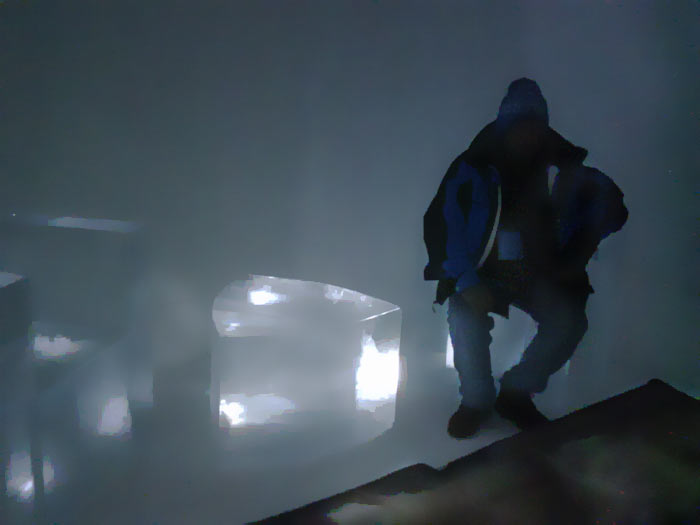
Carol and Sandy Fuchs spent a week in northern Sweden recently, including New Year's at the Ice Hotel near Kiruna, about 100 miles north of the Arctic Circle. The sun never rose above the horizon the whole time they were up there, though the dark of night faded into a sort of twilight for a few hours in the middle of each day.
They tried dogsledding and snowmobiling and visited with reindeer herders. The town of Kiruna is a thriving iron-mining center, where the hundred-year-old mine is nowhere near played out; it is currently expanding closer and closer to the town, which is gradually being relocated to escape the blasting and other mine activity.
The basic structure of the Ice Hotel is made of snow; in November each year, snowguns spray artifical snow over arched metal forms, which are removed after a couple of days, leaving igloo-like tunnels. Interior walls are made of two-ton ice blocks cut from the Torne River and returned to the river when the place starts to melt in April or May. The ice is cut in March and stored for the next winter's construction.
Beds are platforms of ice and snow covered with reindeer hides. Guests sleep in sleeping bags. There are ice sculptures and specially carved ice chairs and tables in the rooms, but according to Carol guests don't usually spend much time lolling about in chairs made of ice. Although she slept well, she reports that Sandy hardly slept at all; he was worried that if he relaxed and closed his eyes, he'd freeze to death and never wake up. The room temperature was about minus 5 Celsius, or 23 degrees Fahrenheit.
The hotel has an ice bar, where drinks are served in glasses made of ice. There's also a restaurant, which serves hot food on regular dishes, in front of a blazing fire.
I'm thinking that part of the rationale for a winter vacation in Arctic Sweden is that it must feel pretty good when you leave; wherever you spend the rest of your winter, even if it's in what you normally consider a fairly wintry sort of place, must seem bright and sunny and maybe even toasty by comparison.
night
Sweden
winter
snow
Sandy Fuchs
Kiruna
ice
Arctic Circle
(Image credit: Carol Fuchs)
Jan 3, 2011
 Mom turned eighty last week, which cannot be. She was always the youngest mother, and she's still much too young.
Mom turned eighty last week, which cannot be. She was always the youngest mother, and she's still much too young.
The celebration, I'm told, included a football game in Arizona. The right team won (Oklahoma).
Sandra Horowitz
birthday
(Image credit: Carol Fuchs)
Mar 21, 2011
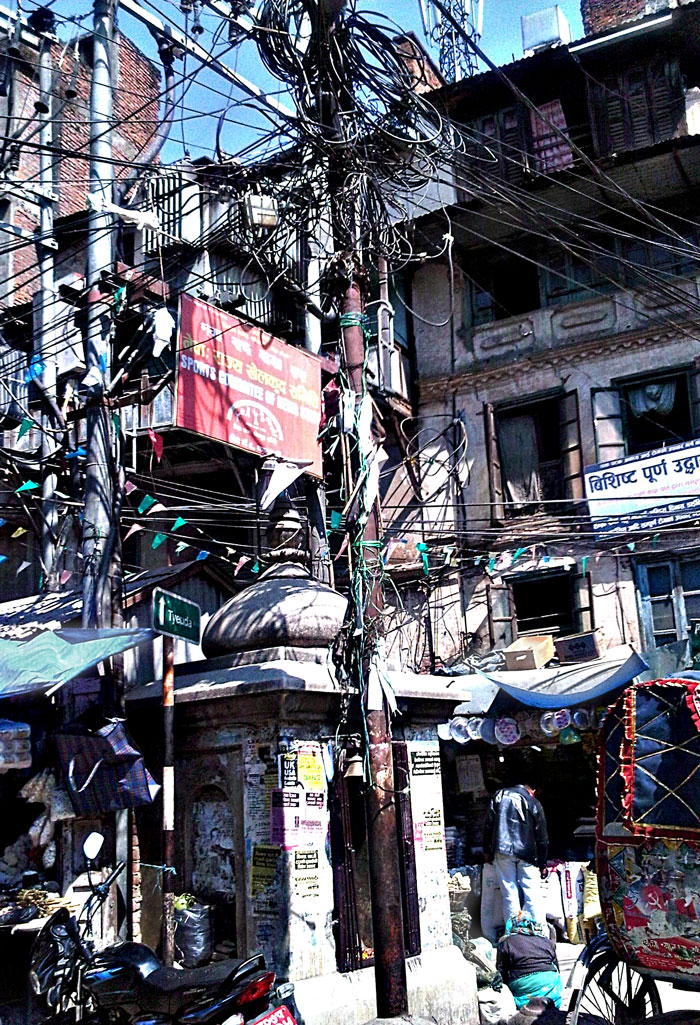 The guidebooks say that Nepal is a "quirky" place, where people use thousand-year-old statues to hold up their clotheslines. The guidebooks are right.
The guidebooks say that Nepal is a "quirky" place, where people use thousand-year-old statues to hold up their clotheslines. The guidebooks are right.
As this photo suggests, Nepalis use a confection of spit and wistfulness to hold up their electrical grid. It works about as well as you'd guess. In the capital city of three million people there is not a single functioning traffic light.
After spending four days knocking about in Kathmandu and another week trudging very slowly through the Himalayan foothills, I filled up my camera with curiosities and have of course become an expert on all things Nepalese. I've got stuff to share in upcoming G'mornin's. But the world has gone on spinning, so Kathmandu cannot always take priority. Glad to be back, hope everybody's well, look forward to hearing everybody's news.
cityscape
streetscape
Nepal
Kathmandu
infrastructure
(Image credit: Carol Fuchs)
Apr 7, 2011
From my sister's collection of Kathmandu signs and posters:
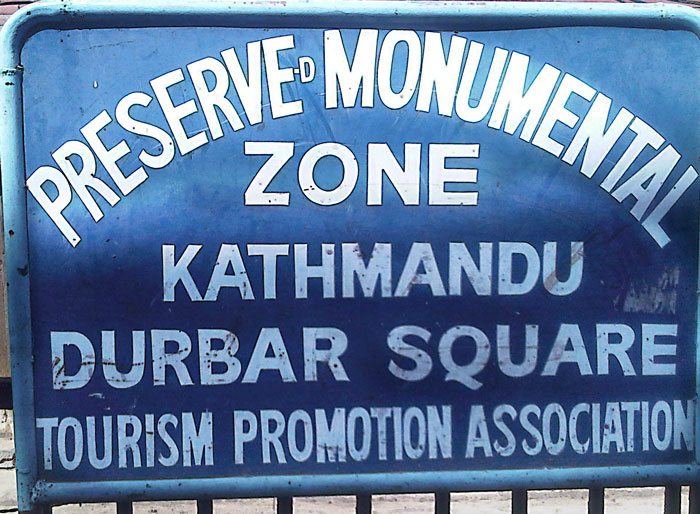
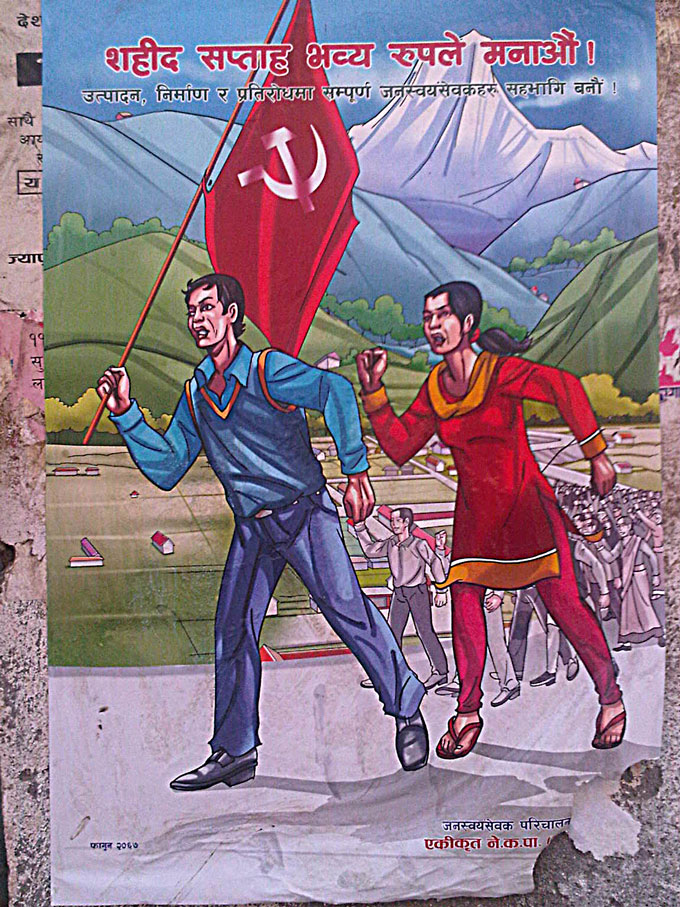 The political poster reflects Nepal's very recent revolution, in which the king was overthrown for a parliamentary democracy. The leading party in parliament is the Maoists, but they didn't quite win a majority of seats; to govern, the Maoists had to form a coalition with the Marxist-Leninists. From what we heard, parliament wasn't doing much of anything and had repeatedly failed to write a constitution.
The political poster reflects Nepal's very recent revolution, in which the king was overthrown for a parliamentary democracy. The leading party in parliament is the Maoists, but they didn't quite win a majority of seats; to govern, the Maoists had to form a coalition with the Marxist-Leninists. From what we heard, parliament wasn't doing much of anything and had repeatedly failed to write a constitution.
Nepal's official communism does not seem to stop Nepalis from operating clearly capitalistic businesses, and the country is currently experiencing a heated real estate boom.
streetscape
Nepal
Kathmandu
signs
(Image credit: Carol Fuchs)
Oct 16, 2011
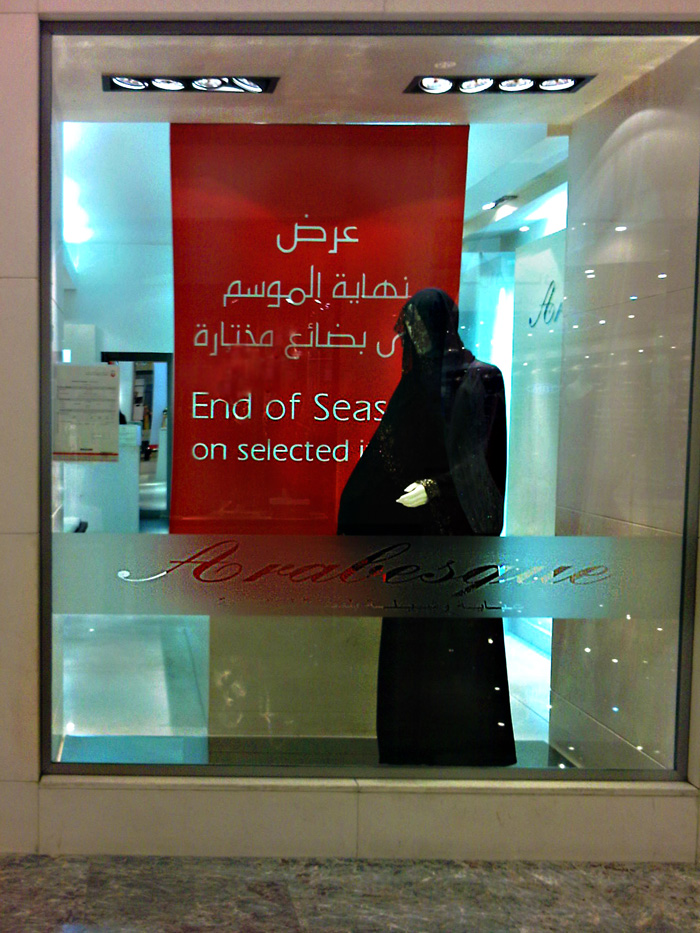 This sign in a store window in a shopping mall isuggests that for the fashion modeled by this mannequin, just like for fashions on mannequins in store windows in malls all over the world, each season brings new styles. Who knew that in Dubai customer interest in clothes like these would wane after a single season?
This sign in a store window in a shopping mall isuggests that for the fashion modeled by this mannequin, just like for fashions on mannequins in store windows in malls all over the world, each season brings new styles. Who knew that in Dubai customer interest in clothes like these would wane after a single season?
window
clothes
Dubai
burqa
shopping mall
(Image credit: Carol Fuchs)
Oct 21, 2011
 I pretty much just have to take my sister's word for it that she snapped this picture of a food court in a shopping mall in the United Arab Emirates, in the city of Abu Dhabi, as opposed to, say, New Jersey. Abu Dhabi is 150 kilometers up the coast from Dubai; you can drive there from Dubai in a couple of hours on Sheikh Zayed Road (Highway E17).
I pretty much just have to take my sister's word for it that she snapped this picture of a food court in a shopping mall in the United Arab Emirates, in the city of Abu Dhabi, as opposed to, say, New Jersey. Abu Dhabi is 150 kilometers up the coast from Dubai; you can drive there from Dubai in a couple of hours on Sheikh Zayed Road (Highway E17).
mall
Abu Dhabi
food court
(Image credit: Carol Fuchs)
Nov 2, 2011
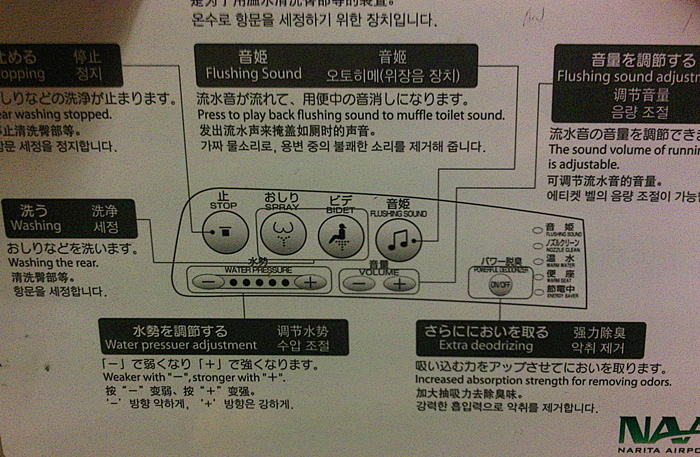 If you happen to need the bathroom while you're in the Tokyo Airport, be sure to allow plenty of extra time so you can study up on the operating instructions.
If you happen to need the bathroom while you're in the Tokyo Airport, be sure to allow plenty of extra time so you can study up on the operating instructions.
Japan
Tokyo
signage
Narita Airport
bathroom
(Image credit: Carol Fuchs)
Dec 29, 2011
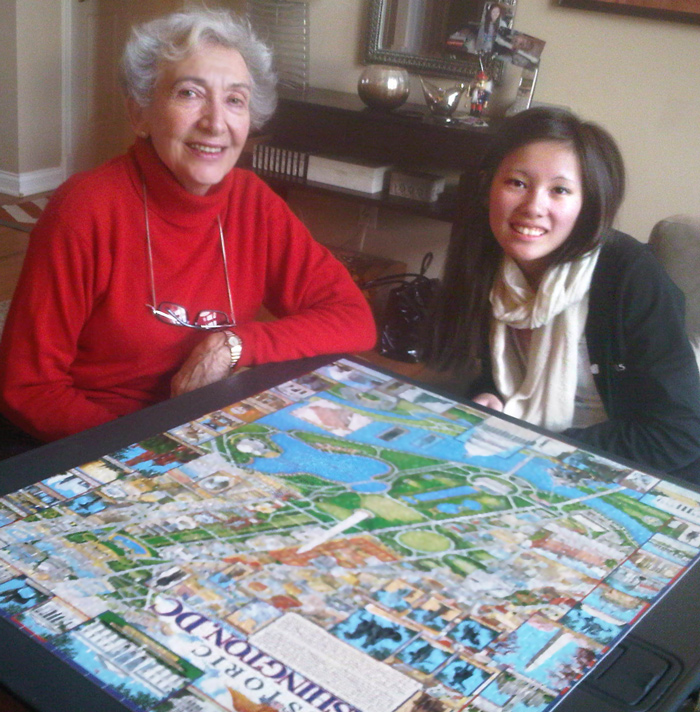 Clear winners of the 2011 Christmas Vacation jigsaw competition are Olivia Horowitz of Bloomington, Indiana, and her grandmother Sandra Horowitz. They correctly assembled a 1,000-piece puzzle in less than 24 hours and would have finished even faster, according to spectators, had it not been for a break to watch a movie.
Clear winners of the 2011 Christmas Vacation jigsaw competition are Olivia Horowitz of Bloomington, Indiana, and her grandmother Sandra Horowitz. They correctly assembled a 1,000-piece puzzle in less than 24 hours and would have finished even faster, according to spectators, had it not been for a break to watch a movie.
December 29 is Grandma Sandy's eighty-first birthday. Olivia, a junior at Bloomington South High School, is sixteen.
family
jigsaw
Sandra Horowitz
Olivia Horowitz
Bloomington
Indiana
(Image credit: Carol Fuchs)
Nov 11, 2012
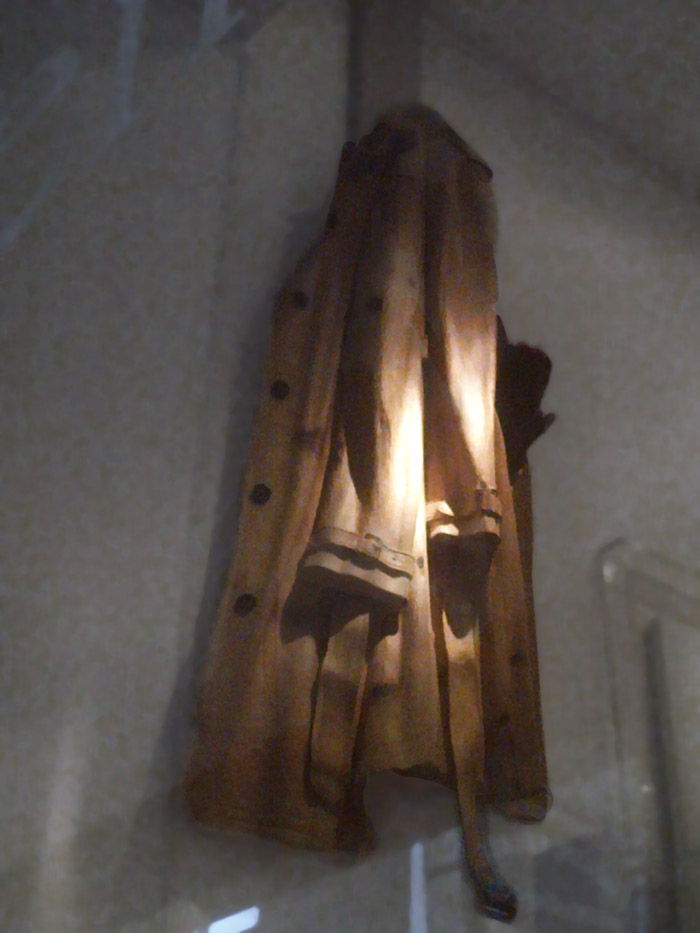 They're asking 7000 Euros in Amsterdam for this trompe l'oeil coat made of wood.
They're asking 7000 Euros in Amsterdam for this trompe l'oeil coat made of wood.
Amsterdam
art
sculpture
trompe l'oeil
coat
(Image credit: Carol Fuchs)
Dec 31, 2012
 A good way to wind down a year is to spend an afternoon playing ball with my dad and his neighbors in the activity room of his Alzheimer's care facility in Kensington, Maryland. Some of the people there, definitely including my 88-year-old father, can still throw and catch and dribble and fake and enjoy (almost) every minute of the game.
A good way to wind down a year is to spend an afternoon playing ball with my dad and his neighbors in the activity room of his Alzheimer's care facility in Kensington, Maryland. Some of the people there, definitely including my 88-year-old father, can still throw and catch and dribble and fake and enjoy (almost) every minute of the game.
My dad has been a ballplayer all his life, and in my mind's eye he'll always be the pitcher for the Army Times softball team in the D.C. summer league.
Meanwhile, that's my son Joe on the piano, picking up the tempo of the afternoon. Joe's always been a piano player and I expect he always will be. For the ballgame, he played everything from Oh Susanna to How Great Thou Art to Bach to Mozart to Scott Joplin.
As for the significance of the passing year and what lies beyond the horizon in 2013: I got nothing.
(This is the moment when I always turn to my children and say: Y'all be sweet.)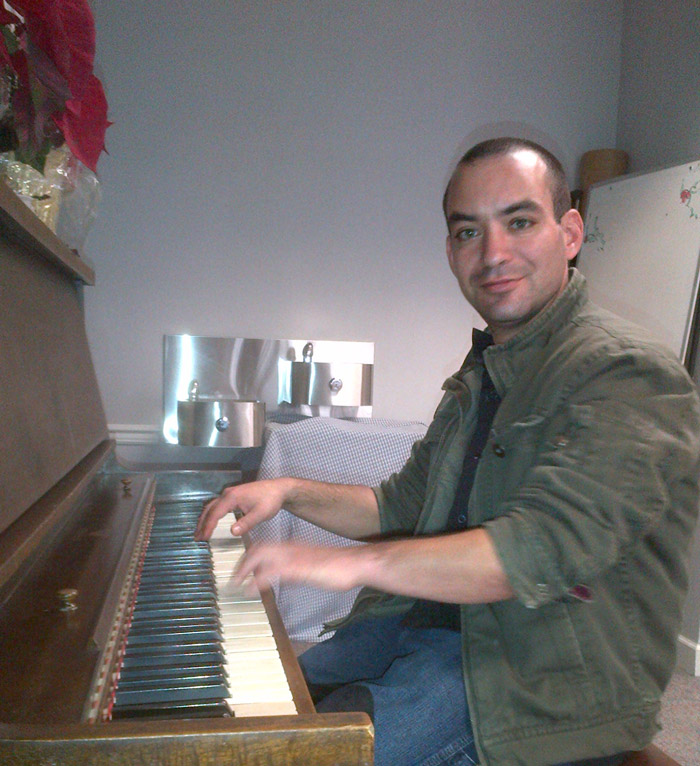
family
Maryland
Joe
Kensington
Grandpa
ball
(Image credit: Carol Fuchs)
May 29, 2014
 Smoke break at the marketplace in Bagan, Myanmar.
Smoke break at the marketplace in Bagan, Myanmar.
"The people are too poor to buy real cigarettes or cigars," noted the photographer. "There are many vendors in the market selling cigarettes or cigars made from local plants, mixed in with a little tobacco, rolled in local leaves. My guess is that smoking is not their biggest health hazard."
streetscape
market
Burma
Myanmar
Pagan
smoke
(Image credit: Carol Fuchs)
Apr 9, 2016
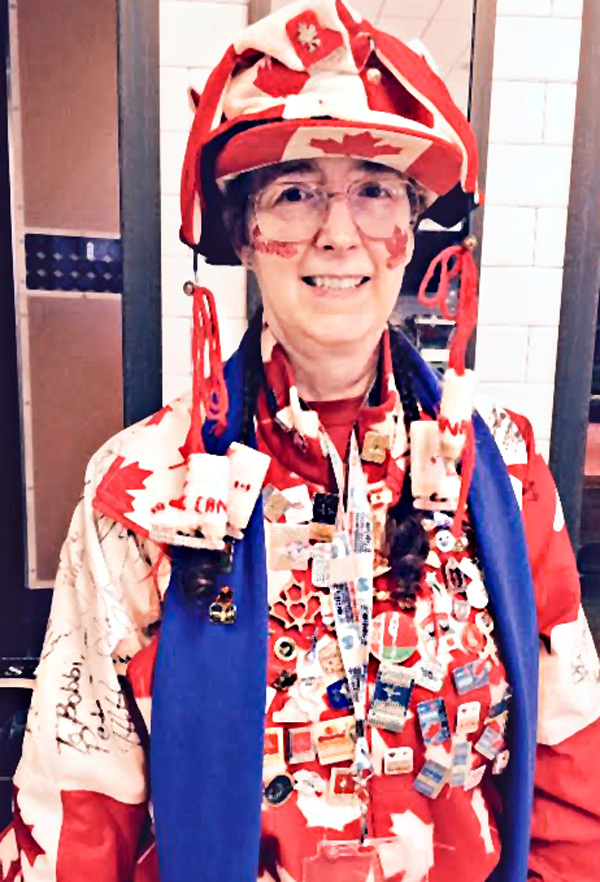
Last week saw the finals of the 2016 World Figure Skating championships, and needless to say, Bobbi Cochar was there for every minute of every program. Ever since she sat rinkside at the Canadian national championships in Ottawa in 1984, this Toronto native has never missed a major skating event, no matter where on earth the venue might be.
She cheers on her Canadians, of course, two of whom, Megan Duhamel and Eric Radford, did skate away with the gold medal last week in the pairs category. But Cochar is really there for all the skaters, making sure that every single one of them receives one of her trademark needlepoint skate ornaments as she or he goes out on the ice, along with a personal note of encouragement and thanks.
Skating looms large in Cochar's heart, especially since her diagnosis with multiple sclerosis at the age of 28. She had always been a noncompetitive dancer, and after her diagnosis, she was stunned to realize that she could still skate, even performing complicated moves and routines. "But once I was off the ice," she recalls, "I couldn't walk to save my life."
Multiple sclerosis has since cost her the hearing in one ear and the color vision in one eye, though the doctor who predicted she'd never walk again was incorrect. She skates six days a week now, four days for her work with the CanSkate program and two days on her own, just because she can.
Until recently, Cochar's mother, also a longtime ice dancer, traveled to skating events with her. The two of them collected autographs on their jackets from skaters all over the world, and took personal responsibility to make sure that anybody at all who was brave enough and hard-working enough to go out there and skate their hearts out in front of a crowd would go home with words and tokens of appreciation from skating's unrivaled superfans.
sports
Canada
Boston
Bobbi Cochar
fans
ice skating
(Image credit: Carol Fuchs)

 Mom turned eighty last week, which cannot be. She was always the youngest mother, and she's still much too young.
Mom turned eighty last week, which cannot be. She was always the youngest mother, and she's still much too young.







 They're asking 7000 Euros in Amsterdam for this trompe l'oeil coat made of wood.
They're asking 7000 Euros in Amsterdam for this trompe l'oeil coat made of wood.


